Health Sciences Newsletter
Summer 2021
Welcome to the third newsletter for the Health Sciences at Friends University. As the Division Chair of Natural Science and Mathematics, I would like to take this opportunity to inform you about the exciting things happening in our Division. We are increasingly involving students in research projects and shadowing experiences. We are providing students with opportunities to travel internationally and experience service learning. Our Health Science Club is active and sponsors a variety of activities ranging from Homecoming floats to Chili Cook-off entries to bringing in medical professionals as speakers. Our division provides you with the tools to grow both intellectually and spiritually. Helping you travel the path to your profession is our ultimate goal. Our faculty are always available to answer your questions, help you decide on a career and guide you through your undergraduate experience. Please feel free to contact me if you have questions.
Nora Strasser, Ed.D. Chair of Science, Technology, Engineering, and Math
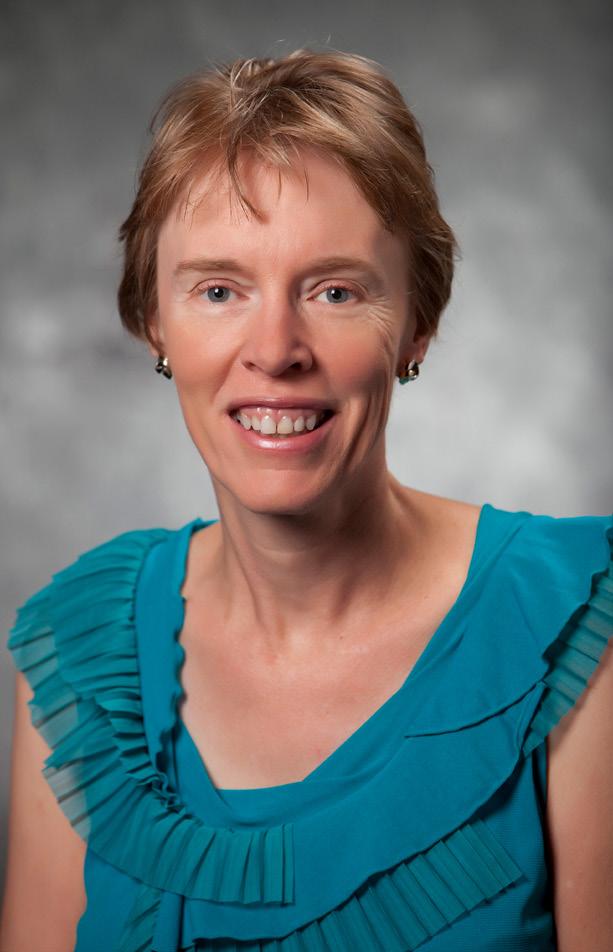
The Benefits of Student Internships and Shadowing
 by Vanessa Aguilar
by Vanessa Aguilar
For my career path, I chose to intern at the Trimmell & Anders Orthodontics office. Shadowing can initiate special relationships and connections with people for career findings to provide information and highlight resume accomplishments. Ironically, during my shadowing experience, I met and befriended a Friends University alumni named Emily Thompson. She played volleyball at the collegiate level and is currently attending dental school at the University of Missouri-Kansas City. Being a fellow student-athlete myself, I was able to ask her many questions about college, her balance with school and athletics and how I can move forward in my education. She explained the expectations and requirements needed to have a competitive resume. Her friendship in the office, along with her kindness and willingness to help me prevail became one of my favorite things about the internship. Not only did I gain shadowing hours and professional
experience in the office, but Emily’s advice also gave me a better expectation for what is ahead of me. I am lucky to attend a school that offers shadowing in professional careers like orthodontics, surgery, physical therapy and even the local press.
FriendsU Pre-PA discussion by Katie Flores-Bailey
What it takes to get into a MPA program
• Apply using CASPA-upload and fill out all the information on this domain and then use it to send our application to different schools you want to apply to. Get this started as soon as it opens for your application cycle.
• You can apply while in college, but your pre-requisite grades and course completion have to be turned in before the program start date.
•
Four letters of recommendation (get on this quick, it takes a long time to get those letters collected depending on who you ask).
•
Know your deadlines and stay organized-especially if you apply to more than one school.
•
Each program you apply to will have slightly different requirements but generally, they will all be similar
- Some places require a certain number of health care experience hours, a certain score on the GRE, or a certain GPA.
- Some schools do not require health care experience hours (but it is strongly encouraged) or the GRE.
Minimum GPA: 3.0
- The health science degree offered at Friends generally covers the prerequisites needed by the different programs, however it is best to consult with your current advisor and potential PA school advisors to ensure you are taking the correct classes.

• If you are a candidate for an interview, you will receive an invitation.
- Set up mock interviews. Dress the part, bring your resume, and be ready to sweat! (Your professors at Friends will help you—they did it for me and many of my classmates.)
• Personally: I recommend taking a pharmacology course even if it is not required. Pharm is a very tough course while in school.
My Experience Applying to Graduate School: Research-based Programs
 by Tristan Sprague
by Tristan Sprague
I began searching for graduate schools my junior year, but I didn’t seriously start until March. It’s very hard to narrow down the search, and it often felt overwhelming! Thankfully, I had a general idea of the research I wanted to do in graduate school to focus on basic research in cell signaling or molecular pathways in disease. A graduate student friend advised me to look at programs in places I would like to live in for the next several years. I don’t like humidity, so Florida was out! I also developed a list of about 10 keywords that described my research interests. Few or zero search hits clearly indicated that a program wasn’t for me. If you have a specific research interest like “Crohn’s disease metagenomics” or “nucleosome structure”, this technique is very powerful.
After I had chosen my top schools, it was time to check their requirements and write my personal statements. Writing my personal statement was almost as much of a marathon as finding schools to begin with. There are two camps of thought on personal statements: 1) write them like you would a cover letter for a job, or 2) tell a personal anecdote to help them see your personality. I blended these options by beginning with a personal story to create reader interest and lead into the highlights of my undergraduate career. Once I had the basic final draft in hand, all I had to do was tailor the last paragraph of the statement to each program and send off my applications!
I started hearing from admission committees in late December, though that is much shorter than most people’s experience. I was invited to a preliminary informal Zoom interview and then a recruitment event lasting several days. During both of these, the faculty wanted to hear about my research. So, get involved in undergraduate research if you haven’t already! Some would ask questions more typical of a job interview (“Why are you a good fit for this program?”), but those questions were rare. All the faculty were friendly, which helped me feel confident instead of intimidated. It was quite fun to sit around with like-minded folks and talk science! At the same time, I was encouraged to ask
them questions to make sure I thought the program fit me—a perspective not found amongst most industry hiring managers! Of the three schools I interviewed with, I eliminated one based on how they handled the recruiting event.
My advice to anyone who wants a research-focused MSc or PhD would be:
1. Use the Google, Luke!
2. It’s OK to take a gap year in order to find the right programs for you. Many of my fellow interviewees took this option, leading to less stress throughout the process. And they knew exactly how to answer the “why this program” question!
3. Budget plenty of time to make that personal statement, but don’t worry about getting it perfect. Admissions will also see your letters of recommendations and your CV.
4. Do research now, or you might be sitting in silence during the interview. Also, jump on opportunities to present your research as a talk or poster; this is the best interview prep!
5. Don’t be anxious about meeting the admissions committee! These are usually composed of ordinary faculty, with a different set of faculty serving each year. So they’re just like professors you’d meet anywhere. Even nationally renowned scientists published in Cell or Nature will be approachable, friendly and conversational. Remember, if you landed an interview, they already like what they see and they want you to like them back!
My Experience With Physical Therapy Shadowing by Lea Coccetella

Physical Therapy consists of in-patient, outpatient and aquatics. In-patient is physical therapy within a hospital and outpatient is typically in a separate building only used specifically for physical therapy. Aquatics can be in-patient or outpatient and is similar to normal physical therapy, but they will often move patients with severe pain and limitations to the pool so it is not as weight bearing on their injury. During my shadowing experience, I shadowed at a variety of locations including three outpatient locations and one aquatic location.
The first location I shadowed was Advanced Physical Therapy in College Hill. This location was honestly the securing factor for me. Seeing how lively the physical therapists were on a daily basis made me want to become a Physical Therapist even more. They were very knowledgeable and had a lot of fun, but they were laborious when it came to helping the patient. It was nice to be able to ask questions about what to expect and their opinion on the program and teachers.
I also had the opportunity to shadow at PT Plus in Augusta and CORE PT here in Wichita. They are chained locations, but they work with different age groups of patients. The Augusta location was beneficial because I was able to aid the therapists with patients above the age of 60. CORE PT taught me how to analyze each new patient. They also performed some of the assessments on me so I could gather a better understanding of what they were trying to locate in terms of mobility limitations and pain in the patient.
Shadowing made me more eager to become a physical therapist and increased my knowledge in the field. This experience gave me the reassurance that I do want to pursue physical therapist as a career. I even decided to pursue a tech job at the Advanced Physical Therapy location to not only boost my resume, but to get a better look at what the work field is like throughout an entire day. I would recommend shadowing to any college student and at more than one location if possible. Being able to be in the field is a good way for students to figure out what they will truly enjoy doing in their future.
Dr. Gary Branum has been a Friends University faculty member for over 15 years. He holds a Bachelor of Science in Chemistry and a Master of Arts in Inorganic Chemistry from the University of Texas, Arlington, along with a Doctor of Physical Chemistry from Texas Christian University. He began his teaching career at Friends University as an adjunct professor and later assumed the role of associate
Faculty in the Spotlight
Dr. Gary Branum, Forensic Toxicologist by Abbey Fischer and Tristan Sprague
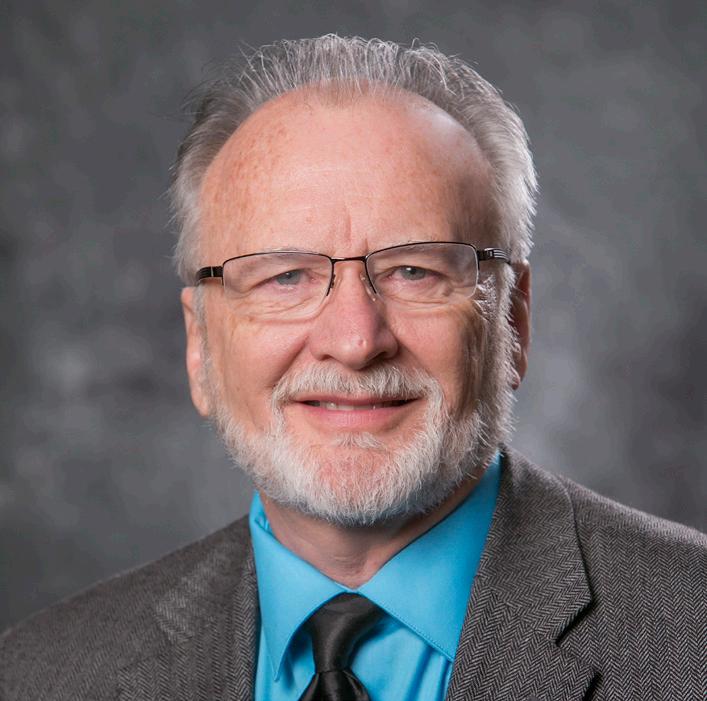
professor of chemistry upon Dr. Moore’s retirement.
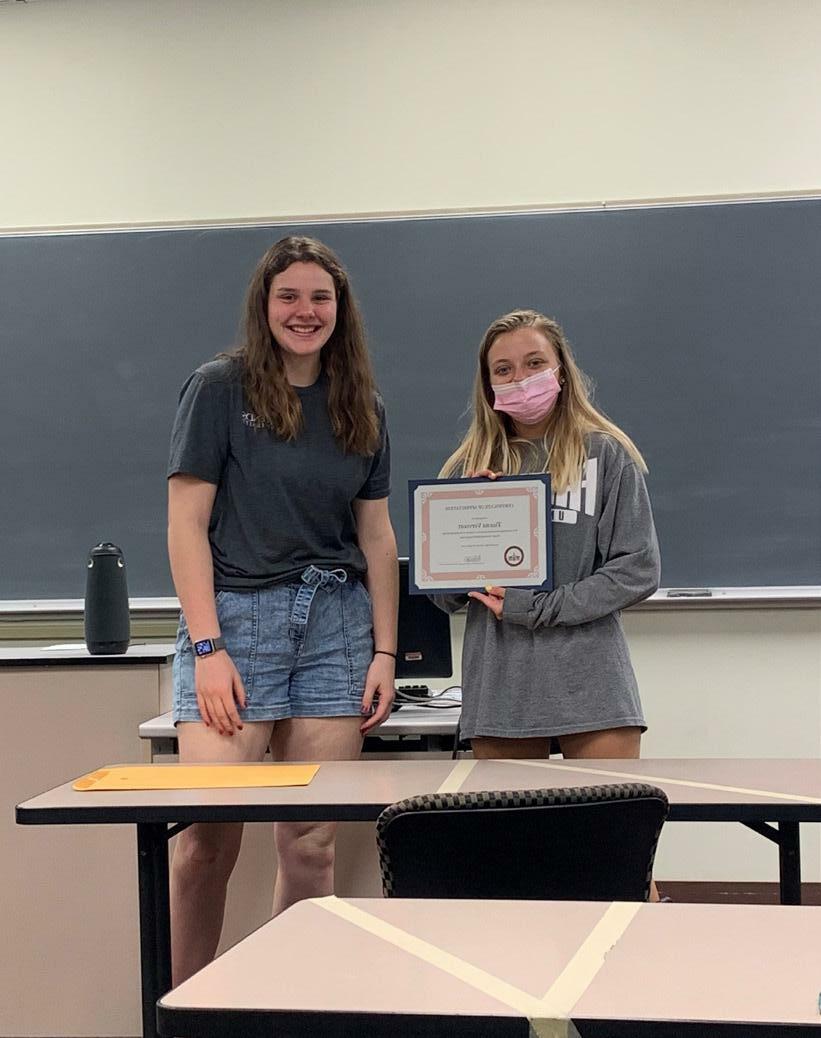
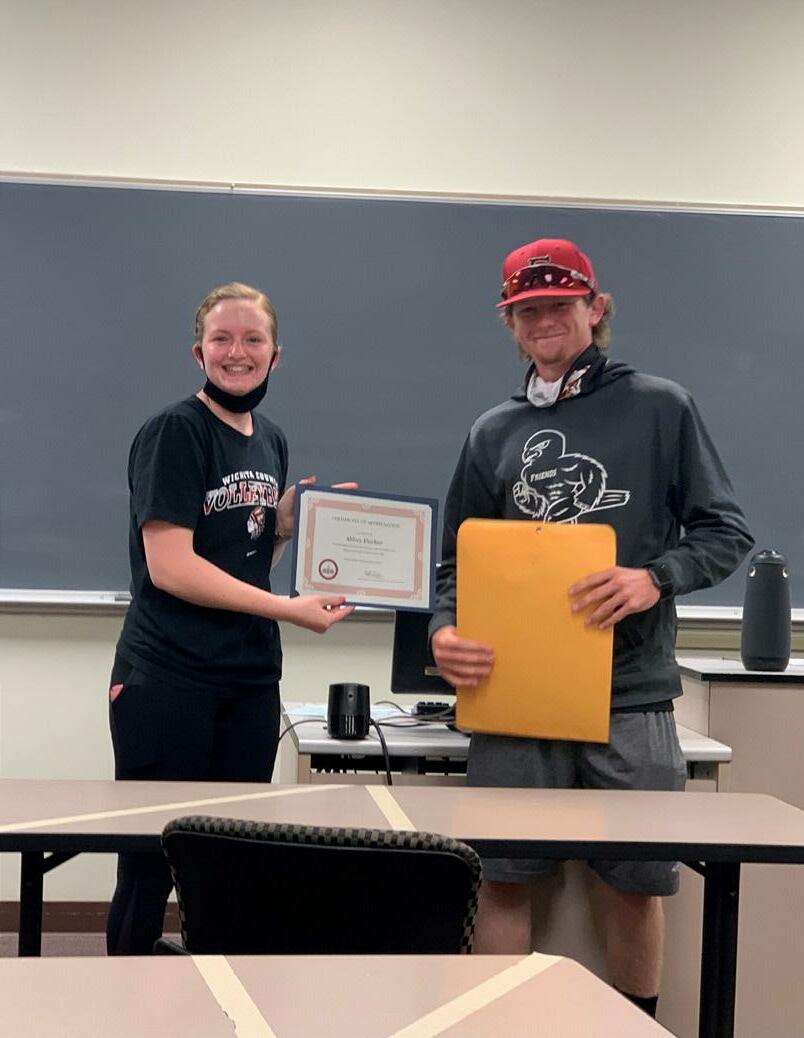

Dr. Branum spent most of his career in forensic toxicology as an analytical chemist. He worked for Associated Pathologists in Las Vegas for 10 years, working his way up to Research Director. Associated Pathologists contracted with local hospitals and law enforcement doing routine pathology and toxicology before entering the drug testing market. During this period, Dr. Branum saw the company expand from five to 22 employees as they grew from processing 2,000 to roughly 75,000 samples per year.
After leaving Associated Pathologists, he consulted privately from 1992 on. He was contracted as an expert witness in DUI, drug and doping cases
by organizations and individuals ranging from the U.S. Air Force to racehorse trainers. He has testified throughout the United States, as well as Hong Kong, Chennai, Stockholm, Calgary, Dubai, Newmarket and Mumbai.
Eventually, he came to Wichita as the Director of Toxicology for the Sedgwick County Forensic Science Center, which at the time was a newly opened laboratory. Dr. Branum worked there for two years before starting his own business but quickly realized his talents were those of a scientist rather than a businessman. That led him to Friends University where he now serves as an Associate Professor of Chemistry and helps to advise for the biochemistry program.
Outgoing Health Science officers Abbey Fisher (Executive President), Tianna Vervoort (VP of Membership), and Tristan Sprague (VP of Finance) were recognized by the club members at the last spring semester meeting.
Executive President: Vanessa Aguilar Sophomore, Health Science major
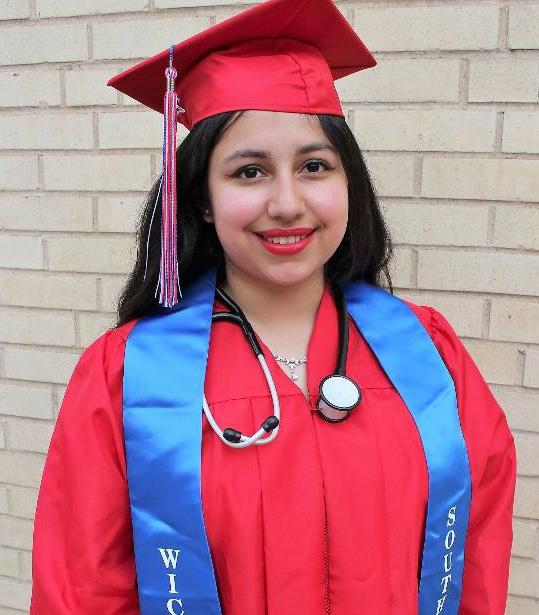

My goal is to be an orthodontist one day and hopefully travel the world. When I am not studying, I enjoy reading, listening to music, exercising, spending time with family and friends, trying new things, or re-watching the Marvel Cinematic or Harry Potter movie series. We are excited to start the year, and I believe in doing everything when the opportunity comes because your life is what you make it.
Vice President of Membership: Scarlett Reed
Junior, Health Science major
My ambitions include being accepted into Medical school. I am originally from Texas but moved here to further my education. I am recently married, a mother to an amazingly imaginative three-year-old girl and of course an officer in the Health Science club. I am looking forward to bringing life to our club this year and can’t wait to see what the year brings.
VP of Finance: Grethel De La Torre
Sophomore, Health Science and Spanish major
I would like to become a plastic surgeon one day, that is why I’m working hard to achieve it. Some of my hobbies are reading, hanging out with friends, playing “Just Dance”, listening to music, and my favorite, roller skating. It’s important to stay positive and safe and do as much as we can. I am very shy at first, but once you get to know me better, you’ll see that I’m very friendly and fun to be around. I love making new friends, so just come talk to me if you need anything and I’ll try my best to help you out.
Charlie’s
MEET THE HEALTH SCIENCE OFFICERS 2021-2022 Important Dates: • August 31 - Welcome Session & Ice Breakers • September 28 - Physical Therapist Speaker + Pumpkin Party announcement • October 26 - Fundraiser to Ghana Trip with
Car Wash Partnership, Pumpkin Party + Ornament Decorating announcement • November 30 - Ornament Decorating
Student Intern at the Veterinary Emergency and Specialty Hospital of Wichita by Cade Nagy
Throughout my time at the Veterinary Emergency and Specialty Hospital of Wichita, I learned countless lessons that will last me a lifetime. I made connections and met tremendous doctors who taught me so many things in the field of veterinary medicine that will benefit me in the future, from getting into vet school, getting a job at a clinic when I graduate and in my future career path. I will cherish my time at the Veterinary Emergency and Specialty Hospital of Wichita forever.
The doctors poured into me daily giving me knowledge on all aspects of being a Doctor of Veterinary Medicine (DVM). Ranging from how to interact with the patient’s owners, taking care of the patients, the financial aspect and how to interact with your staff to get the desired outcome. I got to do things like assist in surgery, assist in therapy, hold patients, help with getting vitals, problem-solving and medical math for IVs and medications.
This experience has helped reinforce my desire to become a veterinarian. I was excited to go to the clinic and learn every day. You never knew what was going to happen that day or what was going to walk through the door. It could be something as simple as a spay/ neuter or something crazy like a Tibial Plateau Leveling Osteotomy (TPLO). You had to stay on your toes at all times—especially working in an emergency hospital.
It’s not like your typical general practice where it’s slow-paced and easy-going. This clinic is very fastpaced and doctors are likely to be treating more than one patient at a time. I found this to be extremely rejuvenating which made my time there seem extremely short each day. There were many days where I would look down at my watch and wonder where the time had gone.
My internship was extremely rewarding and I learned an immense amount of information. The doctors at the Veterinary Emergency and Specialty Hospital of Wichita educated me with real-life situations on a daily basis. This experience has changed my life completely and honestly made me fall more in love with the idea of being involved in veterinary medicine. Thank you, Veterinary Emergency and Specialty Hospital of Wichita, it’s been a true pleasure.
Additional newsletter content is available online at friends.edu/hsnewsletter.
For information about Friends University’s Health Sciences degree: friends.edu/health-sciences admissions@friends.edu 316-295-5100 | 800-577-2233
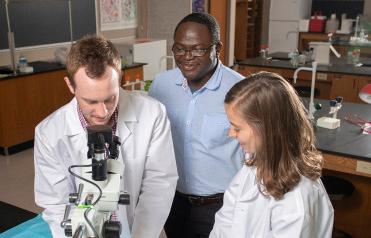

Accredited by the Higher Learning Commission and a member of the North Central Association, 230 S. LaSalle Street, Suite 7-500, Chicago, IL 60604; www.ncahlc.org; 1-800-621-7440.
